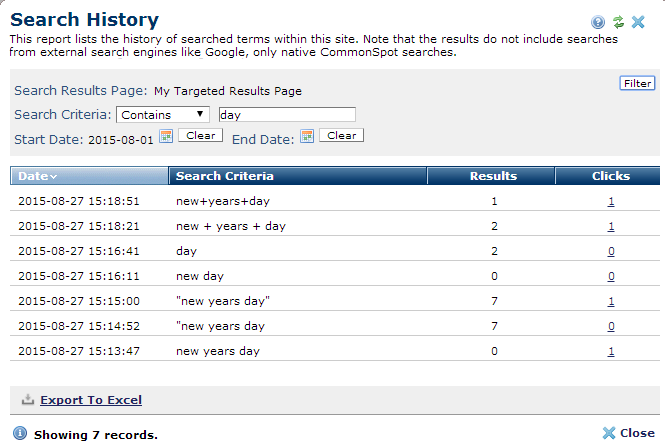
Access this dialog from the Site Search section of the Site Administration accordion menu to review activity and history for specific terms used to search your site. Once you set the reporting period for tracking search terms in Search History Settings, use this dialog to review Search History for a specific search results page for any portion of the reporting period. You can review history for all terms or filter for a specific term, view the number of results returned for each search term, the number of clicks generated for each term, and the pages visitors clicked to.

Search Results Page: Required. Click Choose to pick a specific results page whose history you want to review. Choose does not display if there is only one search results page at your site.
Search Criteria: Optionally pick from the dropdown and enter a search string as filtering criteria. Leave blank to return all terms. CommonSpot returns results matching
Start Date: End Date: Required. Use the calendar date selectors to set a reporting period. (See Date-Time Selection Control in the Contributor's Reference for details).
Click the Filter button to apply your criteria.
CommonSpot returns results within the period defined for maintaining search history.
Click to sort by column head.
Date: Displays the date-time stamp for the search.
Criteria: Displays the terms matching your search term criteria.
Results: Displays the number of pages returned for the criteria specified.
Clicks: Displays the number of times results generated clicks. Click through to view the target page.
 CommonSpot includes the Export to Excel option in multiple reports throughout the system so you can conveniently collect and distribute data for import into spreadsheets or other applications that accept comma-separated values. Click this option to display a table of all fields within the current report, then select the fields whose values you want to export and save in spreadsheet or CSV format. Selected fields automatically display as column heads in the CSV output. You also have the option to change column names on the fly to customize your reports.
CommonSpot includes the Export to Excel option in multiple reports throughout the system so you can conveniently collect and distribute data for import into spreadsheets or other applications that accept comma-separated values. Click this option to display a table of all fields within the current report, then select the fields whose values you want to export and save in spreadsheet or CSV format. Selected fields automatically display as column heads in the CSV output. You also have the option to change column names on the fly to customize your reports.
Related Links
You can download PDF versions of the Content Contributor's, Administrator's, and Elements Reference documents from the support section of paperthin.com (requires login).
For technical support: